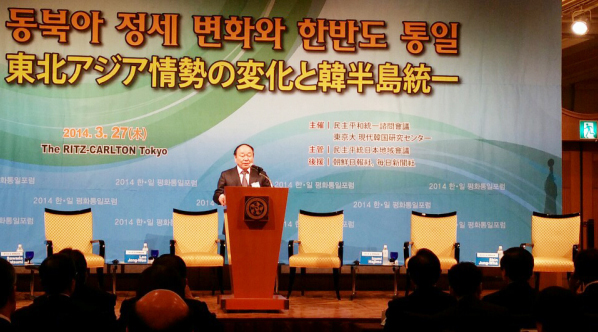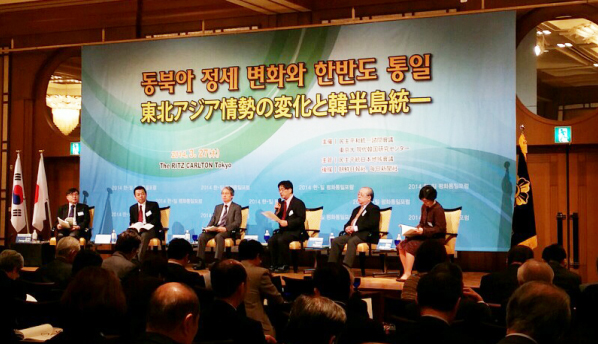| Korea-Japan Peaceful Unification Forum in Tokyo, Japan promoting empathy for Unification Bonanza |
|---|
| Overseas Region Division, 2014-03-27 |
Grand March toward Unification Bonanza by NUAC
Korea-Japan Peaceful Unification Forum in Tokyo, Japan Promoting Empathy for Unification Bonanza
Korea-Japan Peaceful Unification Forum in Tokyo, Japan Promoting Empathy for Unification Bonanza
Hyun Kyung-dae, Executive Vice-Chairperson of NUAC, attended the Korea-Japan Peaceful Unification Forum on March 27 in Tokyo, Japan. Korean peninsula experts from Korea and Japan shared the same recognition that the "Unification Bonanza" mentioned by President Park is a jackpot for not only Korea but also for Japan.
In particular, the forum was held even as the relations between the two neighboring countries were strained by the Abe government's denial of the history between them and challenge against such relations; thus, Japanese news media paid attention to the forum in such tense situation. Experts of the two countries agreed that collaboration between Korea and Japan is essential to solve the nuclear issue of North Korea and achieve unification of the Korean peninsula as well as stability and peaceful prosperity of Northeast Asia. Such atmosphere may serve as an impetus for Japan to take a forward-looking approach to the history issue.
The Mainichi, Asahi Shimbun, and other major news media of Japan covered the forum. Hyun believes that coping with the reckless provocation of North Korea and rapidly changing situation and solving the nuclear issue absolutely necessitate triangular cooperation among Korea, US, and Japan. Nonetheless, seeing such things repeated is enough to make one doubt whether Korea and Japan are close neighbors, he says. He stresses the need for the new future of the two neighbors to be established on the ground of recognizing the history between them as it was.
"The unification bonanza of President Park seeks not only to overcome the division of the Korean peninsula but also to contribute to the peace and prosperity of Northeast Asia as well as the whole Asia and the world. It is an agenda of peace and prosperity, bringing happiness and bonanza to the world. A Unified Korean peninsula will be the base of communication between the South and North economic realms, where the abundant human and material resources of the South move to the North through the Korean peninsula while the diversified natural resources of the North develop the economy of the South. It is a far-reaching geopolitical project. In the middle of the project is Silk Road express (SRX) running through the Korean peninsula, China, and Siberia, proceeding to Europe, Atlantic Ocean, and Mediterranean Sea. The biggest beneficiary of the project will be Japan," Hyun explained.
In his opening speech, KIMIYA Tadashi, director of Center for Contemporary Korean Studies, the University of Tokyo, noted that only Japan will benefit the most from the unification of the Korean peninsula if such is achieved by the initiative of South Korea. According to him, the current situation of conflict between Japan and Korea due to history and territory issues is a serious loss to the two countries. He expects Japan to cope with historical issues including comfort women during the war more positively. He also asks for a more forward-looking policy from the Abe administration of Japan.
"Cooperation between Korea and Japan during the course of unification of the Korean peninsula will be the second stage of normalization of Korea-Japan relations, and it will be a great turning point of 'historical reconciliation'," Prof. Lee Jong-won of Waseda University explained. He also emphasized the importance of Japan's contribution to the unification of the Korean peninsula through "historical reconciliation."
Sawada Gatsumi, Manager of the Seoul Office of the Mainichi, talked about Japan's Role in the Unification of the Korean Peninsula. According to him, the unification of the Korean peninsula is also important for Japan, and Japan's cooperation toward unification is directly connected with the national security of Japan. "Japan may worry about a powerful unified Korean peninsula with regard to an anti-Japan mood, but a 'democratic unified Korea' will stabilize the international relations of Northeast Asia," stressed Lee Jong-guk, researcher of the Northeast Asia History Foundation.
In his suggestion of overcoming the history issue, Gang Hyo-sang, editor of the Chosun Ilbo daily of Korea, noted that Park Geun-hye's government has not refused summit talks between Korea and Japan. If the relations between the two countries worsen after having summit talks, there is no reason to have the talks," he explained. He cited as an example the worsened relations between the two countries after the summit talks of former President Lee Myung Bak of Korea and Noda Yoshihiko, former Prime Minister of Japan in 2011 and said that summit talks between Korea and Japan can be held anytime when Prime Minister Abe and the cabinet ministers look at and recognize history as it was, urging proper measures in advance. On the other hand, according to Hakoda Tetsya, editor of the Asahi Shinbun, both countries should look at reality. If the relations between the two countries deteriorate, a disadvantage would arise, he says. He urged having summit talks without conditions. A total of 250 persons attended the forum including Oh Gong Tae, vice-chairperson of the NUAC Japan Assembly, Heo Maeng-do, adviser of the Korean Associations of Japan, Korean residents in Japan, professors, and journalists.
"Korea has been sending a consistent message that Japan should take sincere measures regarding the comfort women issue; but the relations between the two countries have worsened to the extent that sincere measures on the Japanese side are next to impossible. Therefore, political determination is required to cut off the negative vorticity of the peoples of the two countries," said Prof. Nishino Junya of Keio Univ. Japanese attitude toward history seems to be a stumbling block to the unification bonanza.

